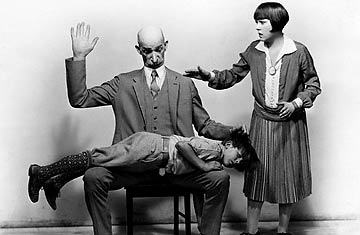
She's not the first American to argue that legislation is the answer. The town of Brookline, Mass., successfully passed a resolution against spanking in 2005, although similar statewide efforts have failed. Last year in Massachusetts and 15 years ago in Wisconsin proposed anti-spanking bills did not get much support in the legislature; critics feared that it would be impossible to enforce a ban against such a common practice. According to the American Demographics' 2004 data, nearly half of parent-age Americans think it is an appropriate mode of discipline for children 12 and younger. Even more surprising, only 27 states have actually banned corporal punishment from their public school systems.
For critics of the ban, the current law — which states that parents, guardians and relatives can use any form of physical discipline that is necessary as long as it is not unjustifiable — is enough. But for Lieber, who hears criticism daily from prosecutors, judges and pediatricians that children are being beaten and their parents are getting off on a technicality, the law doesn't even come close to being enough.
"By law you would have a hard time differentiating between a responsible parent who thinks about parenting and then hits and one that does not," Lieber said. "Responsible parents have to give up the privilege to physically discipline their children for the sake of protecting children that aren't being hit once in a blue moon or in a light way, but are really being hit day after day, many times a day."
But new California bill may have a better chance of success. Unlike previous attempts, the age restrictions will make the bill more palatable to many. "We are talking about babies," said Nadine Block, executive director of the Center for Effective Discipline. "People know that babies don't understand right and wrong. Hitting them is ineffective and can lead to injury." Another plus is that Gov. Schwarzenegger has already noted that he is receptive to the bill. Although the Governor recalled being hit by his father, he said that he and his wife, Maria Shriver, did not practice spanking and preferred other methods of discipline, like threatening to take away playtime. "I think any time we try to pass laws that say you've got to protect the kids, it's, in general, always good," Schwarzenegger said in an interview with the San Jose Mercury News. "I just want to find out from her exactly the way she envisions it and to enforce it and what the whole thing is about."
While the assemblywoman has outlined a proposed punishment, she has yet to address how the bill would be enforced. In Europe, most countries consider the ban on spanking an educational law, which means that on the first couple of offenses parents receive a fine and attend mandatory parenting classes on discipline. "I don't know how the European laws would really translate in the U.S.," Block said. "But I do think an educational law is a good way to go." Like child abuse, unless the child reports it or the spanking leaves a mark and is reported by a relative or teacher, it will be very difficult to detect when parents are violating the law.
"A hundred years ago it was considered a novel idea for the law to say you couldn't hit your wife," said Block. "Today, we can't hit slaves, wives or military personnel. Children are the only class that is unprotected."
